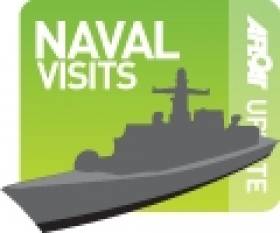Displaying items by tag: Destroyer
Russian Naval Destroyer Departs Dublin
The 534ft long vessel was built for the KGB Maritime Border Guard and is heavily equipped with missiles, torpedoes, guns and the ability to carry helicopters.
Admiral Chabaneko had arrived on Friday afternoon and docked at berth 30 in the inner port area within Alexandra Basin West. The last Russian naval visit was taken by one of her half-sisters, Severomorsk, a Udaloy-I class destroyer that docked at Ocean Pier in Alexandra Basin East for a three-day visit in 2009.
Destroyer's Last Visit to Liverpool
The Royal Navy destroyer HMS Manchester is on its last visit to Liverpool, prior to its decommissioning. The Type 42 destroyer is currently berthed at the Liverpool Landing Stage, where she will be open to the public tomorrow (Sunday) between 12 noon and 4 pm.
One of the most notable actions of the warship's three decades in service was during the Gulf War in 1991. The destroyer was engaged in the Persian Gulf. This was primarily to uphold the trade blockade imposed on Iraq during that country's invasion of neighbouring Kuwait.
Special River-Explorer Cruise's run by Mersey Ferries are scheduled for tomorrow. The cruises will provide an opportunity to sail close to the HMS Manchester, which is berthed alongside the Liverpool Landing Stage.
The cruises are scheduled to run between 11 am to 4pm and they include a live commentary from a Blue Badge Guide. On these cruises the normal ticket price applies. For further information contact Mersey Ferries for timetable and ticket fares on 0151 330 1000 or logon to www.merseyferries.co.uk






























































